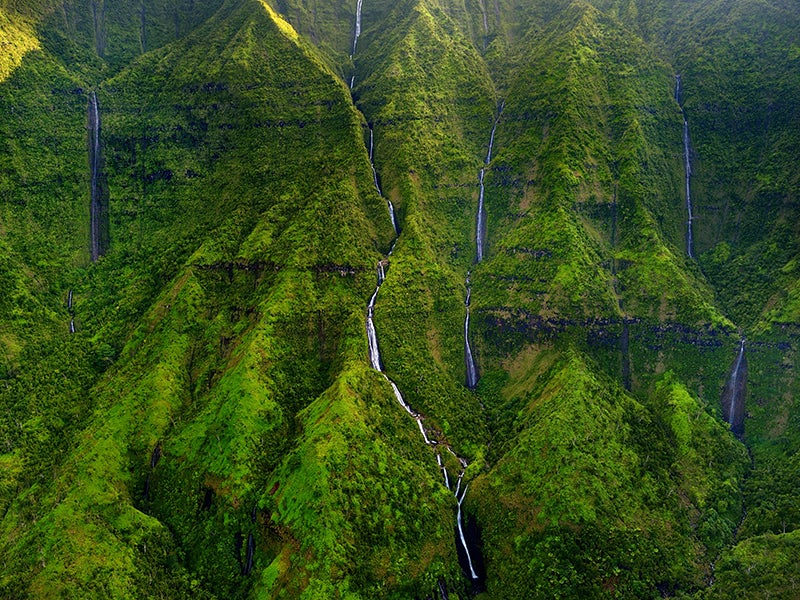Historic Restoration of Wai‘ale‘ale Water on Kauaʻi Heads to Litigation
Kauaʻi utility pulls plug on state water commission’s discussions to increase stream flows
Contact
Yesterday, the Hawaiʻi Commission on Water Resource Management (“Commission”) considered a historic proposal to restore flows to Waiʻaleʻale and Waikoko Streams on the island of Kauaʻi, but the Commission’s deliberations were cut short when Kaua‘i Island Utility Cooperative (“KIUC”) requested a contested case, initiating formal legal action before the agency. The two streams in dispute flow directly from Mount Waiʻaleʻale, a place of paramount sacredness in Hawaiian culture, but have been diverted for almost 100 years by plantations and are now diverted by KIUC to run two small plantation-era hydro plants. The Commission heard public testimony throughout most of the day on a staff proposal to restore less than one-third of the median stream flows. Late in the afternoon, the Commission was discussing recommendations from some Commissioners to increase the proposed restoration to half of median stream flow or more when KIUC requested a contested case, bringing the Commission’s deliberations to an immediate halt.
The dispute over appropriate instream flow levels will now be resolved in an adversarial trial-like proceeding before the agency. Kauaʻi community group Hui Hoʻopulapula Nā Wai o Puna, represented by non-profit environmental law firm Earthjustice, stepped in with its own request for a contested case in response to KIUC’s request. The Department of Hawaiian Homelands also requested to participate.
“Yesterday’s outcome was unfortunate, but consistent with KIUC’s history of disrespecting public trust water resources,” said Adam Asquith, a taro farmer and member of Hui Hoʻopulapula Nā Wai o Puna. “The Commission was doing an excellent job of working towards a more just and balanced mahele [division] of stream waters. When it became apparent to KIUC that it might have to share more stream water with the community, it shut down the entire process.”
The interim instream flow standards (“IIFS”) under consideration at yesterday’s meeting are the primary legal mechanism by which the Commission fulfills its duty to protect stream resources by setting minimum amounts of water that must remain flowing in a stream at all times. An estimated 200 community members attended the meeting on a workday, with a standing-room-only crowd filling Kauaʻi Community College’s Fine Arts Auditorium when the hearing opened.
“The significance of restoring water to this area cannot be overstated or translated easily into a number,” said Debbie Lee-Jackson, a Native Hawaiian cultural practitioner, and member of Hui Hoʻopulapula Nā Wai o Puna. “It’s something you feel in your naʻau when you go to this place; these waters are sacred. I remain hopeful that the Commission will be responsive to community requests to restore flow and justice to these streams.”
KIUC argued at the meeting in favor of continued diversions for its hydro plants, which account for only around one percent of its energy uses. But it was hard-pressed to answer questions from Commissioners asking it to justify its actual water and hydropower needs. Publicly available information shows that the outdated Waihi plants are not integral to KIUC’s generation needs, and are only becoming more obsolete with advancements in renewable energy resources.
“The Commission’s deliberations show that it takes seriously its fiduciary responsibility to protect the outstanding cultural significance and sacredness of these two streams,” said Earthjustice attorney Leināʻala Ley. “While we are disappointed that KIUC has chosen an adversarial path at this time, we remain both hopeful that KIUC will seek a more cooperative and culturally responsible solution, and committed to ensuring an outcome that honors the principle that Hawaiʻi’s streams are a public trust resource and legacy for all.”

Additional Resources
About Earthjustice
Earthjustice is the premier nonprofit environmental law organization. We wield the power of law and the strength of partnership to protect people's health, to preserve magnificent places and wildlife, to advance clean energy, and to combat climate change. We are here because the earth needs a good lawyer.